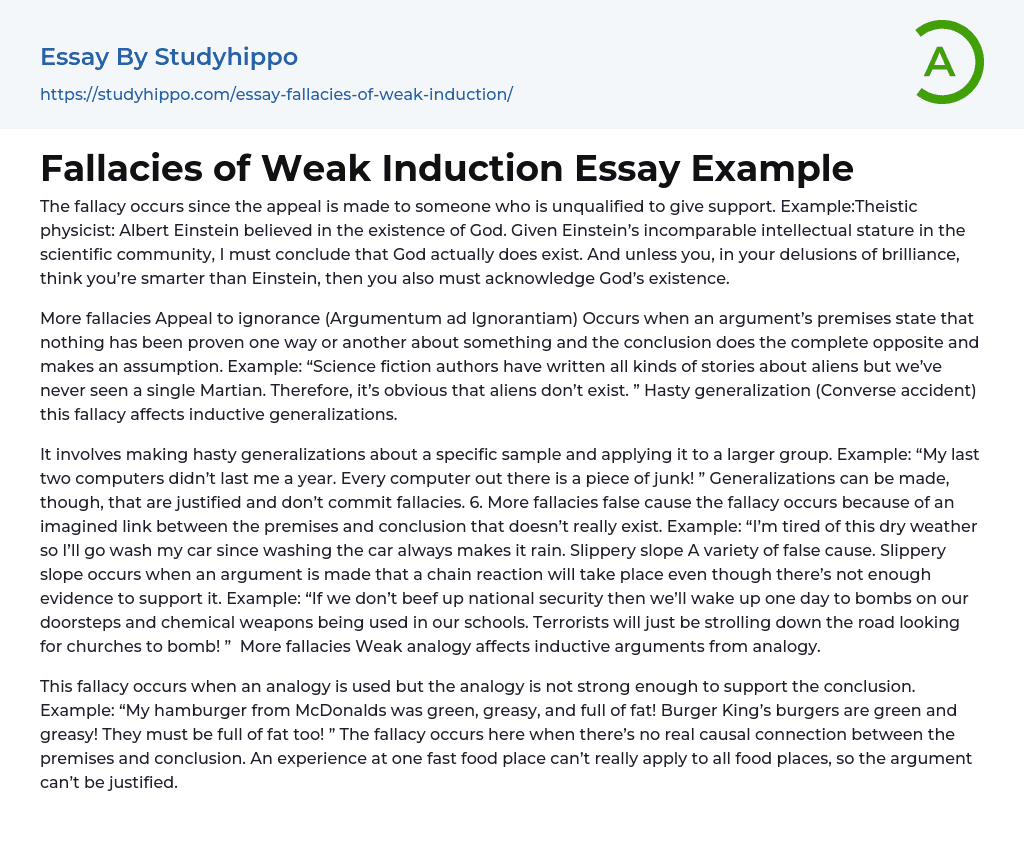The fallacy occurs since the appeal is made to someone who is unqualified to give support. Example:Theistic physicist: Albert Einstein believed in the existence of God. Given Einstein’s incomparable intellectual stature in the scientific community, I must conclude that God actually does exist. And unless you, in your delusions of brilliance, think you’re smarter than Einstein, then you also must acknowledge God’s existence.
More fallacies Appeal to ignorance (Argumentum ad Ignorantiam) Occurs when an argument’s premises state that nothing has been proven one way or another about something and the conclusion does the complete opposite and makes an assumption. Example: “Science fiction authors have written all kinds of stories about aliens but we’ve never seen a single Martian. Therefore, it’s obvious that aliens don’t exist. ” Hasty generalization (Converse accide
...nt) this fallacy affects inductive generalizations.
It involves making hasty generalizations about a specific sample and applying it to a larger group. Example: “My last two computers didn’t last me a year. Every computer out there is a piece of junk! ” Generalizations can be made, though, that are justified and don’t commit fallacies. 6. More fallacies false cause the fallacy occurs because of an imagined link between the premises and conclusion that doesn’t really exist. Example: “I’m tired of this dry weather so I’ll go wash my car since washing the car always makes it rain. Slippery slope A variety of false cause. Slippery slope occurs when an argument is made that a chain reaction will take place even though there’s not enough evidence to support it. Example: “If we don’t beef up national security then we’ll wake up one day to bombs on our doorsteps an
chemical weapons being used in our schools. Terrorists will just be strolling down the road looking for churches to bomb! ” More fallacies Weak analogy affects inductive arguments from analogy.
This fallacy occurs when an analogy is used but the analogy is not strong enough to support the conclusion. Example: “My hamburger from McDonalds was green, greasy, and full of fat! Burger King’s burgers are green and greasy! They must be full of fat too! ” The fallacy occurs here when there’s no real causal connection between the premises and conclusion. An experience at one fast food place can’t really apply to all food places, so the argument can’t be justified.
- Accounting essays
- Marketing essays
- Automation essays
- Business Cycle essays
- Business Model essays
- Business Operations essays
- Business Software essays
- Corporate Social Responsibility essays
- Infrastructure essays
- Logistics essays
- Manufacturing essays
- Multinational Corporation essays
- Richard Branson essays
- Small Business essays
- Cooperative essays
- Family Business essays
- Human Resource Management essays
- Sales essays
- Market essays
- Online Shopping essays
- Selling essays
- Strategy essays
- Management essays
- Franchising essays
- Quality Assurance essays
- Business Intelligence essays
- Corporation essays
- Stock essays
- Shopping Mall essays
- Harvard Business School essays
- Harvard university essays
- Trade Union essays
- Cooperation essays
- News Media essays
- Waste essays
- Andrew Carnegie essays
- Inventory essays
- Customer Relationship Management essays
- Structure essays
- Starting a Business essays
- Accounts Receivable essays
- Auditor's Report essays
- Balance Sheet essays
- Costs essays
- Financial Audit essays
- International Financial Reporting Standards essays
- Tax essays
- Accountability essays
- Cash essays
- Principal essays




